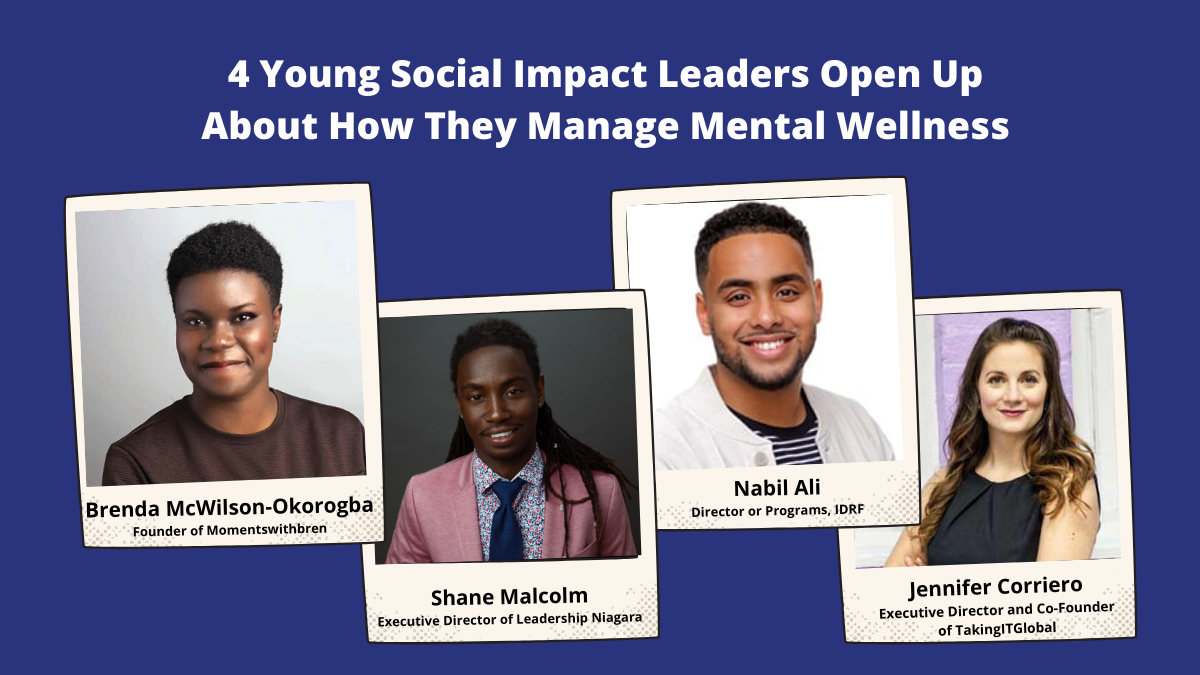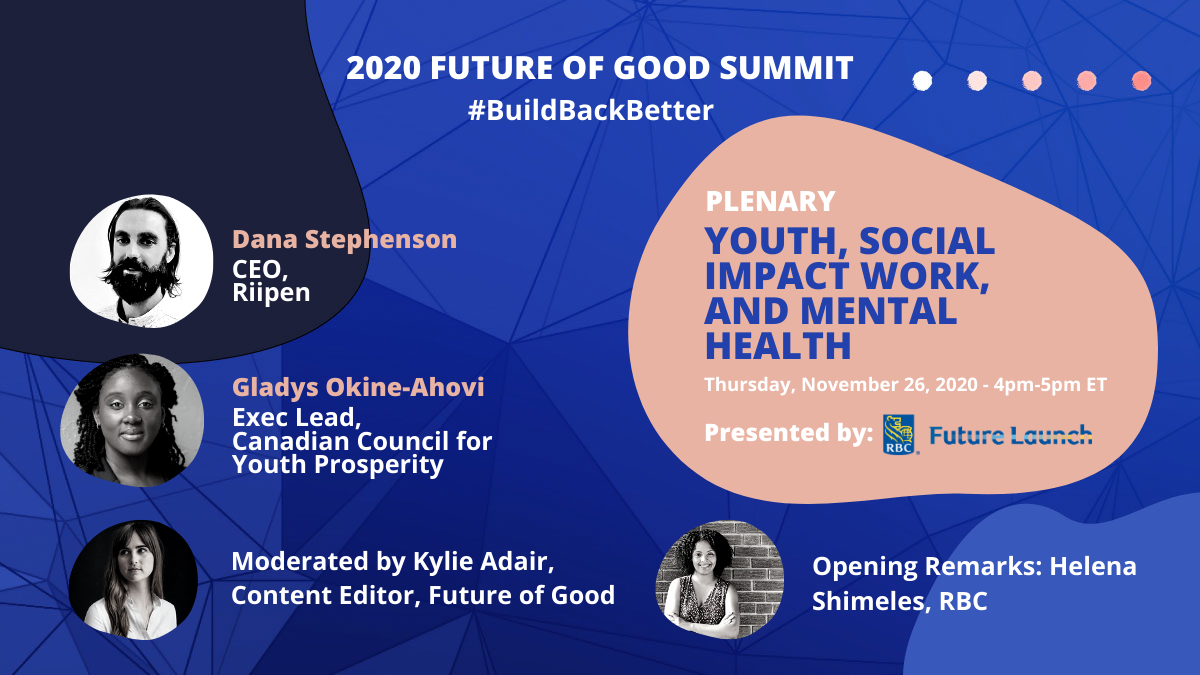4 young social impact leaders open up about how they manage mental wellness
Why It Matters
A sector-wide mental health crisis is looming. Young people are far more likely to report experiencing stress, burnout, anxiety and depression than previous generations. At the same time, youth are also more likely to pursue purpose-oriented careers — and the social impact sector can be high-stress, with an overworked and underpaid workforce.

Young people want purposeful careers. Some research even suggests they’d be willing to take a pay cut for a job that aligns with their values.
But — especially in times of crisis, like now — a career in helping people can be mentally taxing. Communities social purpose organizations serve are devastated by the pandemic, health-wise, socially and economically, and trying to respond to the magnitude of that devastation is taking a toll on the sector’s workers. Experts say a sector-wide mental health crisis is looming.
The good news is that there’s a new generation of social impact professionals working hard to set an example for their teams and colleagues on prioritizing mental wellness. In partnership with RBC Future Launch, Future of Good spoke to four such young leaders. Here’s how they each maintain their mental wellbeing, and support the wellbeing of their teams, while doing world-changing work:
Stay grounded and connected to your mission.
Nabil Ali, director or programs, International Development and Relief Foundation (IDRF)
Nabil Ali’s role means he oversees the organization’s local programs around the world, where team members collect photos and stories from the community members IDRF directly impacts. When Ali feels overwhelmed with the magnitude of his work, he revisits these stories to ground himself. “I see firsthand the impact our projects are having. I see women living in regions of conflict start new businesses and providing hope to their children. Whenever I’m having a rough day, I often take a look at pictures from our projects or speak to fellow team members who have a heartwarming story to share.”
Another approach he takes is to stay focused on what he can do to help solve problems he feels passionate about — and not what’s out of his control. “I’ve come to accept and understand that we cannot solve every problem and challenge worldwide,” he says. “I’ve found it helpful, looking at large scale challenges in a systemic ‘piecemealed’ approach.”
Operate based trust and flexibility.
Shane Malcolm, executive director, Leadership Niagara
The pandemic has presented a lot of logistical upheaval — and stress — for Shane Malcolm, who leads a non-profit that works to inspire civic action among young people. His organization relies on a network of volunteers and volunteer board members, all of whom have been impacted personally in one way or another by the pandemic, so managing that uncertainty and change has been overwhelming, he says.
“I try to do the work when it hits me,” he says. “If I’m up at five or six — I’m a morning person — I do it in the moment, because you’re going to find yourself at 11 o’clock just staring at your screen.” And he’s working to build that culture of flexibility across the organization, a necessity in the work-from-home environment. Trust, too, is a major part of this. “Even with everything externally that’s been going on, people have still been managing to do their jobs and even more. Hopefully, we’re paying attention to those things and take them as a win… The old-school thinking around productivity and employer-employee relationship” is changing for the better, he says. “The deadline is the end goal and how you get there [doesn’t matter]… it’s all trusting that we have the same vision and we’re all working together to get there.”
Set and keep firm work-life boundaries.
Brenda McWilson-Okorogba, founder, Momentswithbren
Brenda McWilson-Okorogba is a mental health educator and life coach, so her own mental wellbeing is top priority. Still, working in a helping profession can feel heavy at times. “I absorb people’s pain and disappointments,” she says, “especially friends and clients that have rough days who share their experience with me. This may lead to having a guilt-filled day or night. Like I want to help the next person but I just don’t have the power, appropriate resources, or wherewithal.”
McWilson-Okorogba deals with this by establishing firm boundaries. “I encourage myself and everyone to develop a healthy, guilt-free and rich life outside of work,” she says. “Developing a self-care plan is very important, while getting an accountability partner to keep you on track. Learn to identify activities and practices that support your wellbeing as a professional and help you to sustain positive self-care in the long-term.”
Make mental health support personal and customizable.
Jennifer Corriero, executive director and co-founder, TakingITGlobal
Jennifer Corriero runs a global network of young people taking on the world’s biggest social challenges — no small feat. Corriero’s approach to creating a safe and supportive environment for her team through this critical work is to individualize that support. “There will not be a ‘one-size-fits-all’ solution,” she says, so it’s important that leaders and employers be open to providing the kind of support that makes sense for each employee — and themselves.
Leaders should also humanize the process of providing support, both for their teams and themselves, she adds. “If someone is struggling and requests time to be able to talk, we cannot underestimate the value of listening. Before jumping into details, be aware of your own capacity to be able to hold space and consider arranging a time when you are grounded and able to be fully present… Various experts have helped me realize the importance of not reacting too quickly in the moment and to hold back on offering advice, ideas or recommendations related to solutions until the person is ready.”

